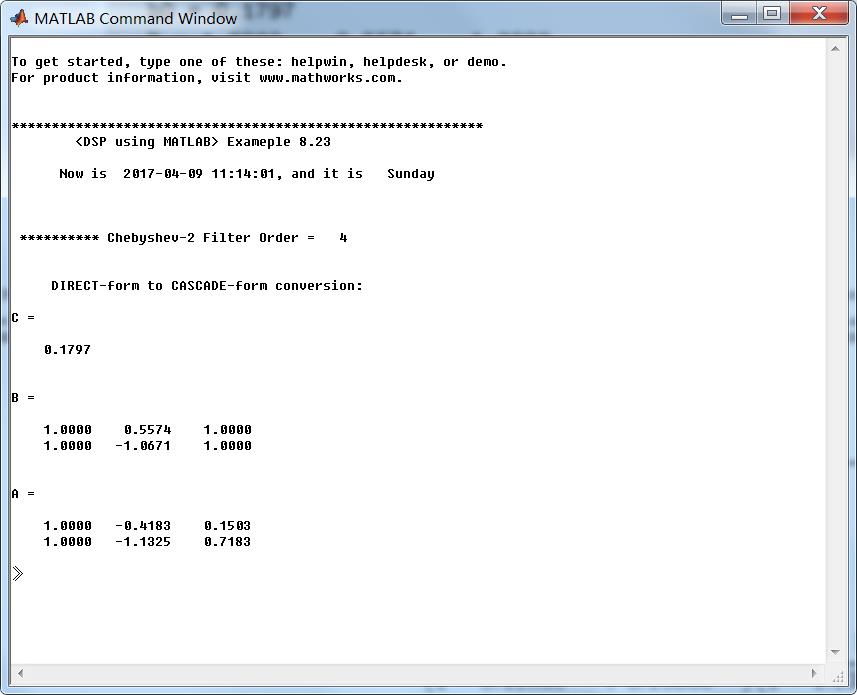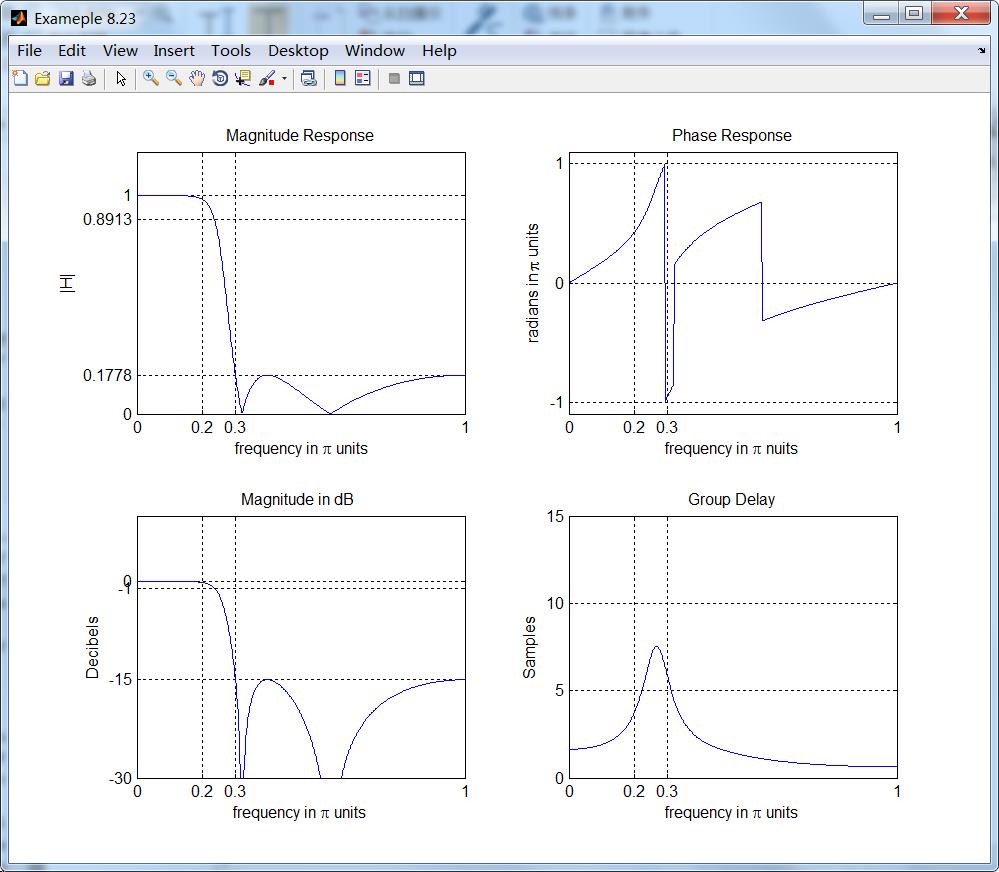《DSP using MATLAB》示例Example 8.23
Posted 沧海一粟
tags:
篇首语:本文由小常识网(cha138.com)小编为大家整理,主要介绍了《DSP using MATLAB》示例Example 8.23相关的知识,希望对你有一定的参考价值。

代码:
%% ------------------------------------------------------------------------ %% Output Info about this m-file fprintf(\'\\n***********************************************************\\n\'); fprintf(\' <DSP using MATLAB> Exameple 8.23 \\n\\n\'); time_stamp = datestr(now, 31); [wkd1, wkd2] = weekday(today, \'long\'); fprintf(\' Now is %20s, and it is %8s \\n\\n\', time_stamp, wkd2); %% ------------------------------------------------------------------------ % Digital Filter Specifications: wp = 0.2*pi; % digital passband freq in rad ws = 0.3*pi; % digital stopband freq in rad Rp = 1; % passband ripple in dB As = 15; % stopband attenuation in dB % Analog prototype specifications: Inverse Mapping for frequencies T = 1; % set T = 1 OmegaP = (2/T)*tan(wp/2); % Prewarp(Cutoff) prototype passband freq OmegaS = (2/T)*tan(ws/2); % Prewarp(cutoff) prototype stopband freq % Analog Prototype Order Calculations: ep = sqrt(10^(Rp/10)-1); % Passband Ripple Factor A = 10^(As/20); % Stopband Attenuation Factor OmegaC = OmegaP; % Analog Chebyshev-2 prototype cutoff freq OmegaR = OmegaS/OmegaP; % Analog prototype Transition ratio g = sqrt(A*A-1)/ep; % Analog prototype Intermediate cal N = ceil(log10(g+sqrt(g*g-1))/log10(OmegaR+sqrt(OmegaR*OmegaR-1))); fprintf(\'\\n\\n ********** Chebyshev-2 Filter Order = %3.0f \\n\', N) % Digital Chebyshev-2 Filter Design: wn = ws/pi; % Digital Chebyshev-2 cutoff freq in pi units [b, a] = cheby2(N, As, wn); [C, B, A] = dir2cas(b, a) % Calculation of Frequency Response: [db, mag, pha, grd, ww] = freqz_m(b, a); %% ----------------------------------------------------------------- %% Plot %% ----------------------------------------------------------------- figure(\'NumberTitle\', \'off\', \'Name\', \'Exameple 8.23\') set(gcf,\'Color\',\'white\'); M = 1; % Omega max subplot(2,2,1); plot(ww/pi, mag); axis([0, M, 0, 1.2]); grid on; xlabel(\' frequency in \\pi units\'); ylabel(\'|H|\'); title(\'Magnitude Response\'); set(gca, \'XTickMode\', \'manual\', \'XTick\', [0, 0.2, 0.3, M]); set(gca, \'YTickMode\', \'manual\', \'YTick\', [0, 0.1778, 0.8913, 1]); subplot(2,2,2); plot(ww/pi, pha/pi); axis([0, M, -1.1, 1.1]); grid on; xlabel(\'frequency in \\pi nuits\'); ylabel(\'radians in \\pi units\'); title(\'Phase Response\'); set(gca, \'XTickMode\', \'manual\', \'XTick\', [0, 0.2, 0.3, M]); set(gca, \'YTickMode\', \'manual\', \'YTick\', [-1:1:1]); subplot(2,2,3); plot(ww/pi, db); axis([0, M, -30, 10]); grid on; xlabel(\'frequency in \\pi units\'); ylabel(\'Decibels\'); title(\'Magnitude in dB \'); set(gca, \'XTickMode\', \'manual\', \'XTick\', [0, 0.2, 0.3, M]); set(gca, \'YTickMode\', \'manual\', \'YTick\', [-30, -15, -1, 0]); subplot(2,2,4); plot(ww/pi, grd); axis([0, M, 0, 15]); grid on; xlabel(\'frequency in \\pi units\'); ylabel(\'Samples\'); title(\'Group Delay\'); set(gca, \'XTickMode\', \'manual\', \'XTick\', [0, 0.2, 0.3, M]); set(gca, \'YTickMode\', \'manual\', \'YTick\', [0:5:15]);
运行结果:



以上是关于《DSP using MATLAB》示例Example 8.23的主要内容,如果未能解决你的问题,请参考以下文章
《DSP using MATLAB》示例Example 6.20
《DSP using MATLAB》示例Example5.17
《DSP using MATLAB》示例Example5.18
《DSP using MATLAB》示例Example5.21